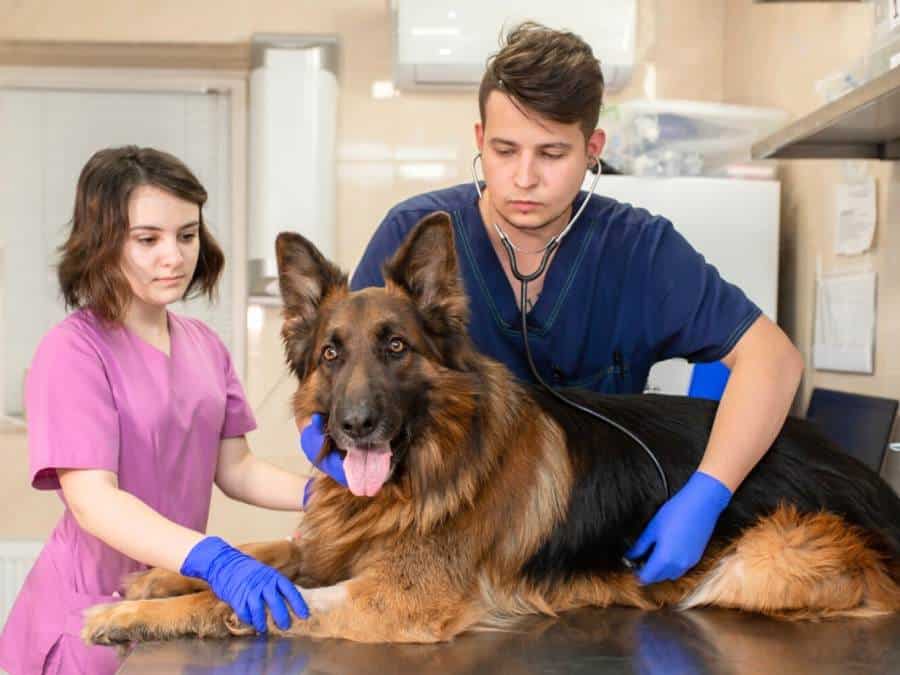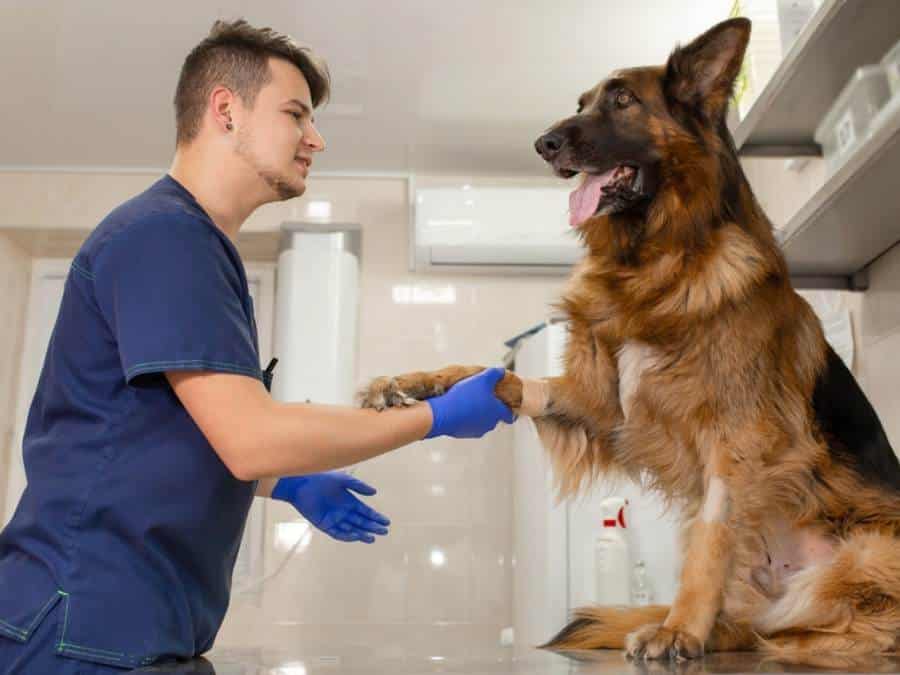From environmental factors to allergic reactions, various issues can trigger itchiness in dogs. Understanding the causes and finding effective treatments for German Shepherd itchy skin is crucial to ensure their comfort and happiness.
Identifying the symptoms, such as excessive scratching, redness, or hotspots in specific areas like the paws or ears, is essential for prompt intervention.
So today’s article will provide valuable insights into managing itchy skin in German Shepherds by exploring treatment options, ingredients to look for in products, and preventive measures to minimize the risk of allergies.
Why Does My German Shepherd Itch So Much?
Itching, also known as pruritus, is a common clinical symptom of various skin conditions in dogs. It is often accompanied by red and inflamed patches on the skin and can even lead to a skin infection called pyoderma.
The dog may experience hair loss, scabs, and in severe cases, raw or bleeding skin due to self-inflicted injuries.
There could be several reasons why your German Shepherd is itching and scratching excessively. It’s essential to consult with a veterinarian for a proper diagnosis and treatment.
However, here are some common causes of itchy skin or ‘pruritus’ in German Shepherds:
1. Atopic Dermatitis: Also called allergic dermatitis (environmental allergies) is a common cause of excessive itching in German Shepherds. Just like humans, dogs can develop allergies to various substances such as pollen, dust mites, certain foods, or even fleas.
These allergens can trigger an immune response in your furry friend’s body, leading to itching and discomfort.
RELATED: German Shepherd Pyoderma Treatment At Home
2. Dry Skin: Just like us, dogs can experience dryness and flakiness, especially during colder months or in environments with low humidity.
Dry skin can be itchy and uncomfortable for your pup. To provide relief, consider moisturizing their skin with pet-safe moisturizers or using a humidifier at home.

3. Parasites: Fleas, ticks, and mites can cause intense itching in dogs. Even if you don’t see any parasites, they might still be present.
Fleas can lead to a condition called Flea allergy dermatitis (FAD), which is a type of allergic skin inflammation that happens when fleas inject their saliva into a dog’s body.
The proteins in the saliva activate the immune system, causing itching that usually lasts for a few days. Even just one flea bite can trigger a reaction.
4. Food Sensitivities: Some dogs can develop sensitivities or allergies to certain ingredients in their food, leading to itching and skin problems.
5. Infections: Bacterial or fungal infections can lead to itching and discomfort. Common infections include yeast infections and bacterial dermatitis.
6. Contact Dermatitis: Dogs may develop skin irritation from contact with certain substances, such as certain plants, cleaning products, or grooming products.
7. Hormonal Imbalances: Hormonal issues, such as hypothyroidism, can affect a dog’s skin and coat, leading to itching.
To determine the cause of your German Shepherd’s itching, a veterinarian may perform tests, such as skin scrapings, blood tests, or allergy testing, to identify the underlying issue.
Once the cause is determined, your vet can recommend an appropriate treatment plan, which may include medications, dietary changes, or changes in grooming and bathing routines.
RELATED: Common German Shepherd Skin Allergies
Meanwhile, here’s how you can treat and prevent mild German Shepherd itchy skin at home.
German Shepherd Itchy Skin Treatment at Home

If your German Shepherd is suffering from itchy skin, here are some general tips that may help alleviate mild itching at home:
1. Use a Medicated Shampoo to Bathe your Dog
Bathing your German Shepherd with a medicated shampoo can provide much-needed relief for their itchy skin. Look for shampoos specifically formulated to soothe and alleviate itching in dogs.
These shampoos often contain ingredients like oatmeal, aloe vera, hydrocortisone, or chlorhexidine, which can help calm irritated skin and reduce itching.
I currently use this Douxo S3 PYO Shampoo for my German Shepherd’s seasonal itching and it helps.
While it may not be a complete solution for German Shepherd itchy skin, this shampoo can provide some relief for allergies without breaking the bank when used in conjunction with other tips mentioned.
Also, it’s important to avoid over-bathing as it can worsen irritation by stripping away natural oils and the protective layer of the skin, leading to increased itching and scratching.
Instead, only use the medicated shampoo as necessary to control symptoms.
After applying the medicated shampoo, make sure to rinse your German Shepherd thoroughly. Leftover residue from the shampoo can potentially irritate their skin further and lead to more itching.
2. Use a Moisturizer and an Ointment
Applying a dog-friendly, hypoallergenic moisturizer can help soothe dry and irritated skin. Look for products specifically formulated for dogs to avoid potential irritants.
I use the Sulfodene Medicated Spray for Dogs which provides the much-needed moisturizing and relief from excessive itching.
Veterinarians have developed this spray specifically for dogs with allergies. It is a clinical formula that can be used at home to provide relief for your furry friend’s itchy skin.
If you notice any areas on your German Shepherd’s skin that appear infected or highly irritated, consider using a thicker cream/ointment that provides both pain relief and healing properties.
I have used this Sulfodene 3-Way Ointment in the past to relieve pain for my dog.
Avoid using human skincare products, as they may contain ingredients that can be harmful to your pet.
To apply the moisturizing spray or ointment, start by gently cleaning the affected area with a damp cloth or mild dog shampoo. Make sure to thoroughly dry the area before applying the product.
Also read: Common German Shepherd Diseases
3. Use Chamomile and Green Tea Soaks
Chamomile contains compounds with anti-inflammatory effects, which can help reduce redness and swelling associated with irritated skin.
Green tea is rich in antioxidants, such as polyphenols, which can help protect the skin from damage caused by free radicals.
Like chamomile, green tea has anti-inflammatory properties that may help soothe irritated skin.
If your dog has itchy and irritated skin, you can try giving them a soothing bath using chamomile or green tea. Here’s what you need to do:
- Fill a bathtub or sink with lukewarm water and steep several green tea bags for three to five minutes.
- After that, take out the tea bags and allow your dog to soak in the mixture for at least five minutes.
- If you want to target specific areas, you can steep a tea bag and let it cool completely before applying it directly to the affected skin.

4. Give your Dog a Colloidal Oatmeal Bath
If your German Shepherd is suffering from itchy skin, a bath with colloidal oatmeal can be a great solution. This will help reduce inflammation and get rid of allergens that may be trapped in their fur.
You can either buy this pre-made organic colloidal oatmeal or make your own by grinding plain, sugar-free oatmeal into a powder.
The anti-inflammatory properties of colloidal oatmeal can soothe redness, swelling, and itching, providing relief for your dog’s uncomfortable skin. The best part is that oatmeal is safe for dogs, so you don’t have to worry if they lick it.
Here’s how you can do it:
- Grind the oatmeal into a fine powder and mix it with water to create a milky solution.
- Pour this solution onto your dog’s body while they are in the bathtub and gently massage it in, focusing on the areas that are most itchy.
- Let the oatmeal mixture sit on their skin for about 10 minutes before rinsing thoroughly and drying them with a towel.
5. Use Aloe Vera on Affected Areas
Aloe vera is not just a powerful healer, but it can also help reduce redness and relieve discomfort caused by heat on the skin.
You can directly apply aloe vera gel to the affected areas on your dog. You can easily find natural aloe vera gel at grocery and drugstores, or you can even use aloe vera from your own plant if you have one at home. Make sure to avoid using aloe vera gel that contains alcohol, as it can potentially burn your dog’s skin and make their symptoms worse.
Here’s one such safe alcohol-free Aloe Vera gel that you can directly apply on your dog’s itchy skin.
6. Choose a Hypoallergenic Diet for your Dog
A hypoallergenic diet is specifically formulated to address common food allergies and sensitivities that can contribute to skin issues in dogs.
To alleviate your German Shepherd’s itchy skin, it’s crucial to identify any potential food allergies or sensitivities they may have.
Common culprits include grains like wheat or corn, as well as certain proteins such as beef or chicken.
Working with your veterinarian, you can conduct an elimination diet or allergy testing to determine which ingredients trigger adverse reactions in your dog.
Once you’ve identified the problematic ingredients, switch your German Shepherd to a hypoallergenic formula that excludes those allergens.
If your German Shepherd has itchy skin, consider giving them Purina Pro Plan Salmon & Rice Formula. It’s the best dog food for German Shepherds with allergies as it doesn’t contain soy, wheat, peas, or corn.
7. Include Fish Oil Supplements in your Dog’s Diet
Fish oil, also known as omega-3 fatty acids, can be beneficial for improving the health of a German Shepherd’s coat and reducing overall inflammation in the body.
Omega 3 fatty acids are usually given in the form of capsules or liquids and have few side effects.
There is scientific evidence supporting the positive effects of omega-3 fatty acids on various aspects of a German Shepherd’s health, including their coat, joints, heart, kidneys, and brain.
You can find omega-3 fatty acids in fish oil or flaxseed oil supplements specifically formulated for dogs. Adding these supplements to your German Shepherd’s diet can improve their overall skin health and provide relief from itching.
You should consider giving them these Omega-3 Capsules. These capsules are meant for large dogs and they can help in improving the condition of your dog’s coat and skin, resulting in less itching and a shiny, healthy coat.

8. Regularly Brush your Dog
Regular brushing is crucial for German Shepherds with itchy skin. It helps remove dirt, debris, and loose hair that can contribute to the itching.
Plus, it stimulates blood circulation and distributes natural oils throughout their coat. Make sure to use a brush specifically designed for your German Shepherd’s coat type.
German Shepherds have a double coat consisting of a dense undercoat and a longer topcoat.
To effectively brush their fur, I highly recommend GoPets Dematting Comb with 2-sided Grooming Rake.
If you don’t brush your German Shepherd regularly, their skin can become covered in a thick layer of hair that blocks air from reaching it. This makes their oil glands less effective and causes them to itch excessively.
9. Add Quercetin & Colostrum to your Dog’s Diet
Quercetin & colostrum have been shown to have anti-inflammatory properties that can help reduce itching and inflammation in dogs.
Quercetin is a flavonoid, a type of plant pigment that gives fruits and vegetables their vibrant colors. It is commonly found in foods like apples, berries, onions, and leafy greens.
While humans often consume quercetin through their diet or supplements for its potential health benefits, it can also be beneficial for our furry friends.
Quercetin has been studied extensively for its anti-inflammatory properties. Inflammation is often the underlying cause of itching and irritation in dogs with skin issues.
Colostrum is the first milk produced by mammals after giving birth, and it contains essential nutrients and antibodies that can help support a healthy immune system.
Colostrum also contains anti-inflammatory properties that can alleviate itchiness in your German Shepherd’s skin. It helps to calm down any redness or irritation caused by allergens or environmental factors.
Here’s an Allergy Relieving Soft Chew for Dogs that contains both quercetin and colostrum.
10. Avoid using Room Fresheners or Perfumes around your Dog
Many room and fragrance sprays contain ingredients that can irritate your dog’s already sensitive skin. These ingredients, such as fragrances and chemicals, can further exacerbate the itching and discomfort your German Shepherd is experiencing.
German Shepherds are known to have allergies, and using room or fragrance sprays can trigger allergic reactions in them.
These reactions may manifest as excessive scratching, redness, swelling, or even respiratory issues. It’s crucial to avoid exposing your dog to potential allergens that can worsen their itchy skin condition.

When to See a Vet for Your Dog’s Itchy Skin?
Itchy skin can be a symptom of various underlying issues, and identifying the cause is crucial for effective treatment. Here are some signs that indicate it’s time to consult with a veterinarian:
1. Persistent Scratching: If your dog is scratching excessively, biting, or licking certain areas of their body continuously, it may be a sign of an underlying problem.
2. Redness or Inflammation: Visible signs of redness, inflammation, or rash on the skin may indicate an issue that needs attention.
3. Hair Loss: Unexplained hair loss, bald patches, or thinning of the coat can be indicative of a dermatological problem.
4. Changes in Behavior: If your dog is becoming increasingly irritable, anxious, or restless due to itching, it’s a sign that the discomfort is affecting their well-being.
5. Sores or Lesions: Open sores, lesions, or signs of infection on the skin should be addressed promptly. This could lead to hotspots or pyoderma.
6. Changes in Eating or Drinking Habits: Skin issues can sometimes be related to allergies or underlying health problems. If you notice changes in your dog’s eating or drinking habits, it’s a good reason to consult with a veterinarian.
7. Ear Scratching or Head Shaking: Itchy skin issues can extend to the ears. If your dog is frequently scratching their ears or shaking their head, it may indicate ear problems that need attention.
RELATED: German Shepherd Ear Mites Symptoms
8. Presence of Fleas or Ticks: If you notice fleas or ticks on your dog, these parasites can cause intense itching and may require specific treatment.
9. Skin Odor: Unpleasant odors from the skin may indicate an infection or other skin problem such as pyoderma.
10. Changes in Skin Color or Texture: Any noticeable changes in the color or texture of your dog’s skin should be investigated.
Remember that early intervention is often key to preventing the progression of skin issues and ensuring your dog’s comfort. If in doubt or if your dog’s itching is causing distress, consult with a veterinarian promptly.

Diagnosing German Shepherd Itchy Skin
Your veterinarian will probably suggest various tests to determine the cause of your German Shepherd’s itchy skin.
1. Skin cytology (scrapings): These tests may include analyzing tissue samples under a microscope to check for mites, bacteria, or fungal infections like ringworm.
2. Intradermal testing: The vet will inject your dog’s skin with a tiny bit of allergen in this test. If there’s swelling within thirty minutes, it means your furry friend is allergic to that substance.
3. Radioallergosorbent test (RAST): This test can help identify environmental allergens such as pollen, mites, etc.
4. Food elimination trial: If food is suspected as an allergen, your vet may recommend a food trial where your dog is given a prescription diet or homemade food without any additional treats. If the itching subsides during this trial, it suggests that food might be the culprit.
RELATED: How to Get Rid of German Shepherd Dandruff

Medical Treatment for GSD Itchy Skin
Depending on the underlying condition, your vet may recommend one of the following options to help get the itching under control:
- Topical corticosteroids: In some cases, veterinarians may prescribe topical corticosteroids to reduce inflammation and itching. It’s crucial to use these under veterinary guidance, as prolonged use can have side effects.
- Antihistamines: These may be prescribed to help alleviate itching caused by allergies. Common antihistamines for dogs include diphenhydramine or cetirizine.
- Oral corticosteroids: Oral corticosteroids may be prescribed for more severe itching and inflammation. However, long-term use should be avoided due to potential side effects.
- Antibiotics: If your German Shepherd has bacterial or fungal infections on their skin, the vet might prescribe antibiotics. It usually takes about 21 to 30 days for these medications to completely clear up the infections.
- Steroids: Steroids such as Glucocorticoids, can work really well for German shepherds with itchy skin. However, they may cause some side effects such as making the dog feel more hungry and thirsty. These medications are usually given for a short time only.
- Anti-itch medication: Dogs with itchy skin often receive medications like cyclosporine, oclacitinib, and essential fatty acids to help manage their symptoms.
- Medicated shampoos or sprays: Veterinarians may recommend medicated shampoos or sprays containing ingredients like oatmeal, aloe vera, or medicated compounds to soothe and heal the skin.
- Flea & tick control: Regular use of effective flea and tick preventatives is essential to prevent infestations, which can cause intense itching.
Conclusion
I hope that the information provided in this article has been helpful in understanding the causes and treatments for your German Shepherd’s itchy skin issue. By implementing the strategies and remedies discussed, you can provide relief and improve your furry friend’s overall skin health.
Remember, prevention is key to managing itchy skin in German Shepherds. Regular grooming, a balanced diet, and a clean environment are essential. Incorporating natural remedies and supplements can provide further relief. If your German Shepherd’s itching persists or worsens, don’t hesitate to seek professional help from a veterinarian.
Frequently Asked Questions (FAQs)
1. What causes German Shepherds to have itchy skin?
German Shepherds can have itchy skin due to various reasons, including allergies, fleas or ticks, dry skin, fungal or bacterial infections, or even hormonal imbalances. Identifying the underlying cause is crucial for effective treatment and relief.
2. How can I relieve my German Shepherd’s itchy skin?
To relieve your German Shepherd’s itchy skin, you can try regular grooming to remove loose fur and debris, use a hypoallergenic shampoo specifically formulated for dogs with sensitive skin, ensure a balanced diet with essential fatty acids, and consult with a veterinarian for appropriate medication or treatments.
3. Are there any home remedies for soothing my German Shepherd’s itchy skin?
While home remedies may provide temporary relief for your German Shepherd’s itchy skin, it’s important to consult with a veterinarian first. Some options include oatmeal baths to soothe irritation, coconut oil as a moisturizer, or adding fish oil supplements to their diet for its anti-inflammatory properties.




